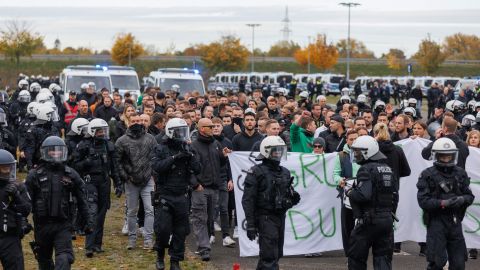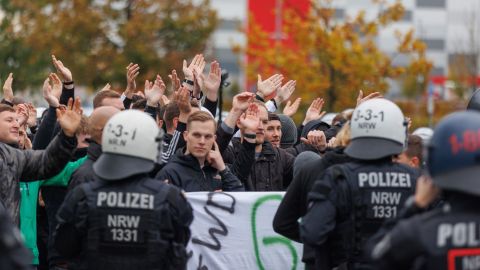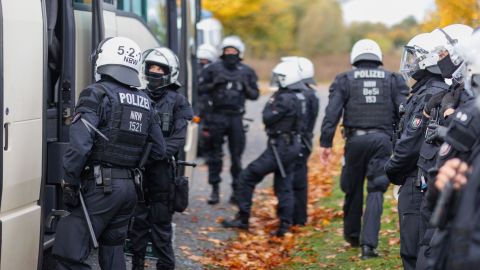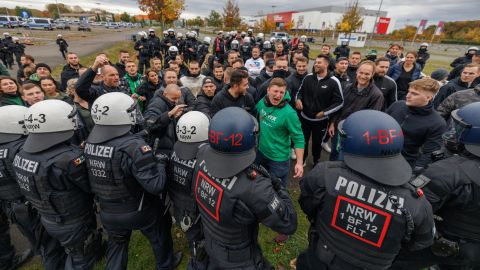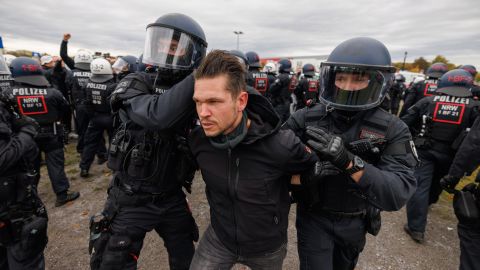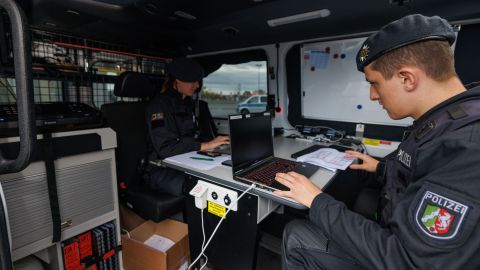The whipper-in with his long, tied-up blond hair beats the drum to the beat, his buddies carry a self-painted banner in front of them: "Green blood runs through our veins". Then they chant well-known fan battle cries: "Football fans are not criminals", "Away with stadium bans". The helmeted police officers are confronted by more than 100 supporters of the Grün-Weiß soccer club in their usual outfits of jerseys, club scarves and mostly black caps. Hooded up, they give the police the finger, set off pyrotechnics, shout and insult the officers just a few meters away. They stand face to face. Long before kick-off, the troublemakers are already in a riotous mood. It quickly becomes clear: there is a lot for the police to do in front of the soccer arena in Paderborn on this sunny autumn day. Locking up, pushing away, arresting - the full program. The full range of police tactics and measures are required to deal with escalating problem fans.
In an emergency, every move has to be right.
Christine Frücht
However, it's all just an act. The troublemakers are people from our own ranks. But the situation seems so explosive that you could almost forget it was an exercise in preparation for the 2024 European Football Championship in Germany. That's how well the plainclothes police officers, who have taken on the job of violent soccer supporters, are doing their job. The fake fans are important so that the colleagues from Bochum, Bielefeld, Dortmund, Essen, Münster and Recklinghausen can do their job of protecting the matches, the teams and the spectators perfectly. On the way there, training under the most realistic conditions possible, such as on this day at the stadium of second-division soccer club SC Paderborn 07, is essential. "In an emergency, every move has to be right. In this respect, we need adequate training opportunities," says Christine Frücht, Director of the State Office for Training, Further Education and Personnel Affairs of the NRW Police (LAFP NRW), emphasizing the approach of this exercise.
There are many scenarios to master here.
Fabian Liekmeyer
At the Paderborn stadium grounds, these "special soccer operations" are prepared by the LAFP NRW together with the Bochum riot police department and the Bielefeld police headquarters. A total of around 800 men and women are deployed. The various police units practise the individual operational procedures and the joint tactical approach. The full-scale exercise, which also involves the parking lot of the former state garden show grounds, has a lot to offer, and not just in terms of manpower. The officers have dozens of emergency vehicles and buses as well as technical aids such as drones in their luggage.
Fabian Liekmeyer is also taking part. Together with his colleagues, the 27-year-old from Dortmund is initially setting up a so-called "processing line". This is where people who have caused disturbances or committed crimes on the journey are recorded. Who went on a rampage during a stop at the freeway service station? Who set off pyrotechnics? Equipped with a laptop and camera, personal details are recorded and, if necessary, photographs are taken of the people so that the perpetrators can be identified during subsequent investigations.
"There are many scenarios to deal with here that we encounter in real life," reports Liekmeyer. Even if everything in this case is an act, the everyday stress of work definitely comes into play. This full exercise differs from the usual training sessions in the unit: "Here we have a full disruptive block of 100 people. If we play through this alone, the personnel capacities are already very limited. Everything is much more realistic this way."
Professional soccer is currently no longer possible without the police.
Martin Hornberger
The host agrees. "Professional soccer is currently no longer possible without the police," says Martin Hornberger, Managing Director of SC Paderborn 07, who is keeping a close eye on events around his stadium. In 2020, Minister Reul and the clubs of the two national leagues signed a cooperation agreement on stadium alliances in NRW. These exercises are part of the stadium alliances. However, the COVID-19 pandemic initially prevented these exercises from taking place. Hornberger: "It's not for nothing that they say you never stop learning. Training and further education are important in every profession. Of course, this also applies to the police. We are happy to support this."
Regular full-scale exercises in public spaces have been an integral part of police training in North Rhine-Westphalia for years. This applies in particular - but not only - with regard to soccer. For normal matches, for derbies, for high-risk games in the various leagues. But also with a view to the 2024 European Championships, where there will undoubtedly be a lot in store for the police in the state. Four of the ten venues - Cologne, Düsseldorf, Gelsenkirchen and Dortmund - are located in North Rhine-Westphalia, and 20 matches will be played here. The other six venues are spread across six different federal states. "By training for such highly dynamic and complex operational situations, we not only create the conditions to be well prepared for the reality of complex operations," says Director Frücht. "In this way, we can also operate safely and professionally according to the same standards throughout the country."
Back to Fabian Liekmeyer and his work. In order for the Paderborn-born police officer to be able to detect potential criminals at his home game, Jasmin Schulte-Ortbeck and her task force have to get to work first. The 37-year-old police chief superintendent heads the 9th group of the Recklinghausen riot police and is in charge of the task force that is to remove the rioters and troublemakers from the guest fan bus. Once both the outer and inner barriers and the processing lane are in place, the men and women of the police squad go in. Before that, they have to wait. This is also part of police work.
After all, the vehicle is very full, very loud and very stuffy - just like a bus with drunk and heated soccer fans arriving at the stadium. First, the passengers who want to leave the bus voluntarily are escorted out. Then come the rest. There is little sign of voluntariness here. The officers sometimes have to help a little.
The train harmonizes as a team, which is very important.
Jasmin Schulte-Ortbeck
Afterwards, Jasmin Schulte-Ortbeck is very satisfied: "It went really well. The train harmonized as a team, which is very important. For me, the most important thing is that the communication between us works. It doesn't work without good communication." The feedback from her platoon and superiors is also positive across the board. The only fly in the ointment: even with an exercise as large as the one in Paderborn, time is running out. In fact, not all measures, for example when clearing the bus, can be applied and tested for their effectiveness or appropriateness.
Rival fan relations will arise at the European Championships.
Dirk Hulverscheidt
Even though the European Championships are still a good 15 months away, preparations for the soccer spectacle have long since begun in the country. It all started shortly after Germany was awarded the contract in summer 2018. As with the 2006 World Cup, the "Command, Control, Deployment and Crime Prevention" subcommittee (UA FEK) of the Conference of Interior Ministers once again asked the most populous federal state to set up a project group to develop a police framework concept for the police work of the federal and state governments.
It is clear: Just because it is "merely" a European Championship, the challenges are no smaller than, for example, the "summer fairytale" almost 17 years ago. On the contrary. Although the European Championship has 24 teams and the World Cup has 32 teams, there is one major difference: "At the World Cup, there are teams that have almost no potential for disruption. At the European Championships, on the other hand, we will have a concentration of matches in which rivalry or hostile fan relations arise," explains Chief Police Director Dirk Hulverscheidt, who heads the project group developing the police framework concept (see also "Streife" 01/22).
In addition, Germany is an open country in the middle of Europe - with very easy travel options. In contrast to the last World Cup tournaments in Russia and Qatar, many fans do not have to travel long and complicated distances.
Roughly speaking, this describes what units need to be able to do.
Brigitte Piekarczyk
While the drones circle in the Paderborn sky, Brigitte Piekarczyk remains on the ground. However, the tasks of man and machine are the same: observing. The 46-year-old works at the LAFP NRW as a concept developer for the training of the riot police. A quality management system has been in place since 2019 to ensure the same standards in training throughout the state and to monitor them effectively. Piekarczyk: "Broadly speaking, it describes what units need to be able to do and what measures we need to take to get there." In short: theory meets practice.
"Together with my colleagues, I am here on site to give feedback," says the police chief inspector. She doesn't see herself "as the one standing by with a raised index finger". Instead, at the end of the day, there is an open look at what went well and what went badly. Moreover, the whole thing is not a one-way street. During her visits to training courses, such as the one in the East Westphalian district town, Brigitte Piekarczyk checks whether the standards that were once set are actually still appropriate for the current situation - or whether this has now developed in a completely different direction. "If there is a hitch somewhere in the transfer of training into practice, then it may well be that the fault lies with us and we need to change something."
There are no hitches anywhere in Paderborn. In the late afternoon, things slowly calm down around the Schauspielhaus soccer stadium. Banners are rolled up, people get on buses, vehicles leave the grounds, the drum is packed up. All conflicts dissolve. And suddenly, for the first time that day, a peaceful atmosphere settles over the soccer stadium again.
